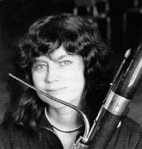|
The Lindsay I mean
Lindsay Cooper (born 3 March 1951, London) studied classical bassoon at the Royal College of Music and entered the rock and improvised music scene early '70s. She toured and recorded with Henry Cow and its offspring Art Bears 1974--8, sessioned with rock musicians and songwriters as Mike Oldfield and did occasional TV ads. She started playing soprano saxophone and piano, too.
In the late-1970s she was a founder member of the famous pool of female musicians called Feminist Improvising Group, which toured Europe. Lindsay Cooper, Georgie Born, Maggie Nicols, Sally Potter, and Irene Schweizer kept the Feminist Improvising Group alive through 1982, and during this time, Cooper also recorded and performed with Mike Westbrook, Maarten Altena, David Thomas' Pedestrians, and in that same year, she founded her own group, the Lindsay Cooper Film Music Orchestra. With this band she wrote and performed many film and TV scores, the most notable of which, at the time, was for Sally Potter's debut feature film, The Gold Diggers.
Cooper did not, however, limit her activities to her own band. As the decade progressed she also founded the band News from Babel together with Chris Cutler, Dagmar Krause, and Zeena Parkins and wrote the music for it. Lindsay Cooper is perhaps best known for her 1987 song cycle Oh Moscow featuring herself, Phil Minton, Potter, Hugh Hopper, Marilyn Mazur, Alfred 23 Harth, and Elvira Plenar.
In 1991 Cooper was diagnosed with multiple sclerosis. She declined to tell anyone, decided to concentrate on composing but went on performing all over the world. In the early 1990's she issued two collections of dance pieces (Schrödinger's Cat / An Angel on the Bridge) and premiered "Songs for Bassoon and Orchestra" in Bologna. She also performed the debut of her "Concerto for Sopranino Saxophone and Strings" at the British Conservatory. Her chamber pieces "The Road Is Wider Than Long" was included in the first "British Women Composers" sampler.
At the same time her last long jazz vocal composition "Sahara Dust" was released, reaffirming her rare gift of versatility across so many musical genres. Based on texts of Australian writer Robyn Archer, "Sahara Dust" is a meditation on the first US Gulf War and describes a world being reduced to Sahara dust (rain bearing particles of sand from the Middle East) little by little as people watch the conflict from their television screens; they come to realize that this is not a distant situation with far flung consequences, but one on which the idea of community and collective survival depends.
Beside the collaboration with former Feminist Improvising Group members and women of the second feminist musician generation she was also working intensively with Phil Minton and Alfred Harth. In 1998 Cooper's battle with MS had become such a rigor that she was forced to disclose it to the musical community. She has been largely inactive since that time as all of her energy and resources -- as a musician she had no health insurance proper and public assistance is hardly adequate -- had been spent dealing with her disease. Active or not, Cooper remains a hugely respected and influential figure throughout Europe. Her works are regularly performed and in some visionary conservatories, even taught. |
 |
|
A second bio - the male Lindsay Cooper
Most of internet music search facilities and discographies confuse Lindsay Cooper with the male bass and cello player Lindsay L. Cooper (1940-2001). Astonishingly very often the male Cooper’s work is ascribed to the female Lindsay Cooper. Therefore it is necessary to say a few words on Lindsay L. Cooper who seems to be more or less unknown because he has moved to and fro to marginalized regions like Scotland, Switzerland and the Atlantic and the Indian Ocean.
After longer labour as ship musician L.L. Cooper studied with Pete Ind. In the 1970’s he played and recorded with Mike Oldfield, John Stevens, Trevor Watts, Ken Hyder, Evan Parker, and also Traditional jazz, as well as rock and folk groups (like the Strawbs in 1970). He has toured, broadcast and gigged with the above and also with Stan Tracy, Keith Tippett, Derek Bailey, Kenny Wheeler, Ken Colyer, Paul Rutherford, Lockjaw Davis, Bobby Bradford, Lol Coxhill, Yuseef Lateef, D.J.s, and underground pop bands. During a longer stay in Zurich, Switzerland, he also played and recorded with Swiss musicians like Urs Blöchlinger, or Christoph Gallio and Dieter Ulrich. Back in Scotland he played with the Bill Wells Octet and ran a free improvisation workshop in Edinburgh.
e-mail
|
|

